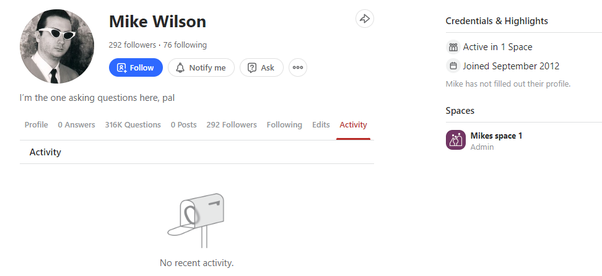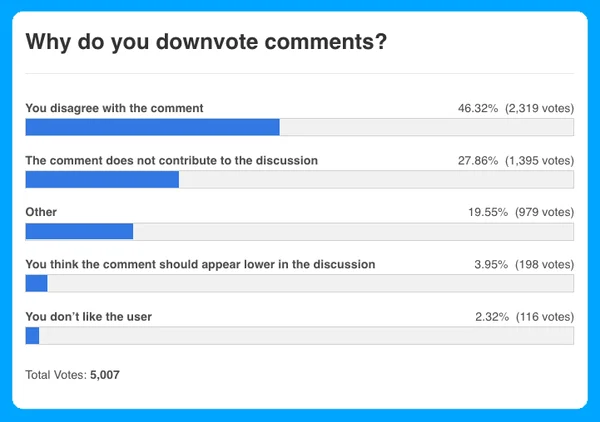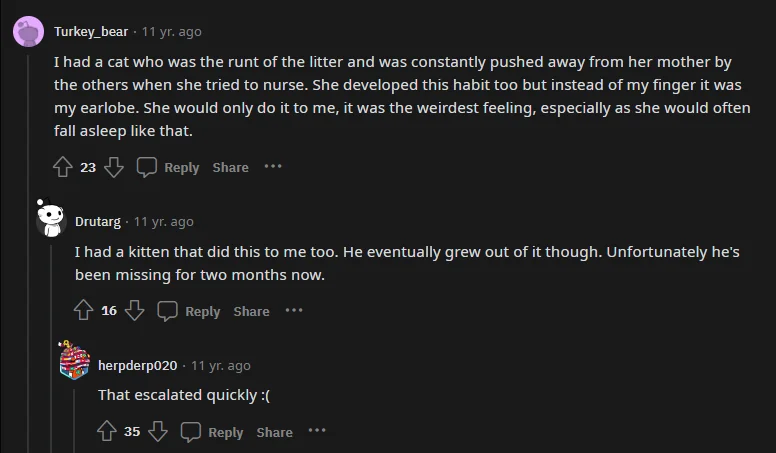Understanding why people downvote comments can be a complex and multifaceted issue. One possible reason for downvoting comments is a difference in opinion. People may downvote a comment simply because they disagree with the perspective or viewpoint expressed.
This could be due to ideological differences, personal biases, or a lack of understanding of the topic at hand. Additionally, some individuals may downvote comments as a way to express their frustration or dissatisfaction with the content of the comment. This could be a result of feeling offended, insulted, or triggered by the comment in question. In some cases, downvoting may also be a form of retaliation or punishment for a perceived slight or offense. Furthermore, individuals may downvote comments in order to signal their disapproval or disinterest in the discussion.
This could be a way for them to communicate their lack of support for the comment or to indicate that they do not find the comment valuable or relevant to the conversation. Ultimately, understanding why people downvote comments requires a nuanced understanding of human behavior, psychology, and social dynamics. By recognizing the various factors that can influence downvoting behavior, we can better navigate online interactions and foster more productive and respectful discussions.

Common Reasons Behind Downvoting
Downvoting is a common occurrence on various online platforms, such as social media, forums, and websites. There are several reasons why users may choose to downvote a post or comment. One of the most common reasons is disagreement with the content or opinion expressed. Users may downvote a post if they do not agree with the perspective or argument being presented.
This can lead to a difference in opinion and result in the downvoting of the post. Another reason behind downvoting is the quality of the content. Users may downvote a post if they feel that it is poorly written, lacks substance, or is not relevant to the discussion at hand. Additionally, downvoting can also be a way for users to express their disapproval of offensive or inappropriate content. If a post contains offensive language, discriminatory remarks, or violates community guidelines, users may downvote it as a way to signal their displeasure.
Finally, some users may downvote a post simply because they do not find it interesting or engaging. This can be subjective and vary from person to person, but ultimately, if a post fails to capture the attention or interest of the audience, it may receive downvotes. Overall, downvoting can be a way for users to express their opinions, signal disapproval, or indicate the quality of the content being shared.
The Impact of Tone and Content on Comment Ratings
When analyzing the impact of tone and content on comment ratings, it becomes evident that the way in which a message is delivered greatly influences how it is perceived by others. The tone of a comment can set the overall mood and attitude of the message, affecting how readers interpret the content. A positive and respectful tone is more likely to garner higher ratings, as it conveys a sense of professionalism and consideration.
On the other hand, a negative or hostile tone can turn readers off, leading to lower ratings and potentially damaging the credibility of the comment. Additionally, the content of a comment plays a crucial role in determining its rating. Comments that are informative, relevant, and well-supported are more likely to receive higher ratings, as they contribute to the overall discussion in a meaningful way.
Conversely, comments that are irrelevant, off-topic, or lack substance are likely to be rated lower, as they do not add value to the conversation. In conclusion, the impact of tone and content on comment ratings highlights the importance of effective communication and thoughtful engagement in online interactions. By being mindful of how we deliver our messages and ensuring that our comments are relevant and well-supported, we can positively influence how our contributions are perceived and rated by others.

The Role of Community Standards and Norms
Community standards and norms play a crucial role in shaping the behaviors and interactions of individuals within a society. These unwritten rules serve as a guide for how members of a community should conduct themselves and interact with one another. They help establish expectations for what is considered acceptable or unacceptable behavior within a particular group or community.
These standards and norms are often influenced by cultural, social, and historical factors, and they can vary greatly from one community to another. They provide a sense of belonging and identity for individuals within the community, helping to create a shared set of values and beliefs that bind them together. By adhering to these standards and norms, individuals can build trust and cooperation with others, fostering a sense of unity and cohesion within the community.
Additionally, community standards and norms can also serve as a form of social control, as individuals who deviate from these expectations may face social consequences such as ostracism or exclusion. Overall, community standards and norms are essential for maintaining harmony and order within a society, guiding individuals in their interactions with others and helping to create a sense of collective responsibility and accountability.
Strategies to Avoid Receiving Downvotes
Receiving downvotes on online platforms can be frustrating and disheartening for many users. To avoid this negative feedback, there are several strategies that can be implemented. One effective strategy is to carefully consider the content of your posts before sharing them. It is important to ensure that your posts are well-researched, respectful, and contribute positively to the discussion.
Additionally, engaging with other users in a polite and constructive manner can help to build a positive reputation and reduce the likelihood of receiving downvotes. Another strategy is to avoid controversial topics or making inflammatory statements that may provoke negative reactions from other users. Instead, focusing on sharing valuable information, asking thoughtful questions, and participating in meaningful conversations can help to cultivate a more positive online presence.
Finally, being open to feedback and willing to learn from mistakes can also be beneficial in reducing the number of downvotes received. By taking these proactive steps, users can improve their online interactions and minimize the risk of receiving negative feedback from others.

Analyzing the Psychology Behind Downvoting Behavior
Downvoting behavior in online communities can be a complex and often misunderstood phenomenon that can have significant psychological implications. When individuals downvote a post or comment, they are essentially expressing their disapproval or disagreement with the content.
This act can be driven by a variety of factors, including personal beliefs, values, and emotions. One possible explanation for downvoting behavior is the concept of social comparison theory, where individuals compare themselves to others in order to evaluate their own self-worth. By downvoting someone else’s content, individuals may be seeking to elevate their own status or sense of superiority within the online community.
Additionally, downvoting behavior can also be influenced by feelings of anonymity and disinhibition that are commonly associated with online interactions. When individuals feel that their actions are anonymous and have no real-world consequences, they may be more likely to engage in negative behaviors such as downvoting. Furthermore, research has shown that downvoting can also be a form of social punishment, where individuals use it as a means of enforcing social norms and maintaining group cohesion.
Overall, understanding the psychology behind downvoting behavior is essential for promoting a more positive and supportive online environment. By recognizing the underlying motivations and emotions that drive individuals to downvote, online communities can work towards fostering a more inclusive and respectful culture where differing opinions are valued and constructive dialogue is encouraged.
